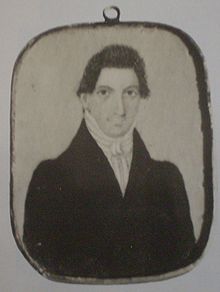Mariano Boedo

Mariano Joaquin Boedo born Mariano Joaquin de Boedo y de Aguirre, (25 July 1782 – 9 April 1819) was an Argentine statesman and soldier. He was a representative to the Congress of Tucumán which on 9 July 1816 declared the Independence of Argentina, signing the Declaration of Independence as a vice president of the Congress.
Boedo was born in Salta. His father was Antonio de Boedo y Garcia and his mother was María Magdalena de Aguirre y de Aguirre-Calvo de Mendoza, who belonged to one of Latin America oldest aristocratic families. Boedo was a descendant through his mother of Francisco de Aguirre, a conquistador of Chile, the son of Constanza de Meneses, who was a great granddaughter of Juan Alfonso Téllez de Meneses IV conde de Barcelos y I de Ourém.[3] [4]
Boedo was sent to
Boedo took an active role in the military campaigns in the northern provinces with Martín Miguel de Güemes. He also served as governor of Córdoba.
The





